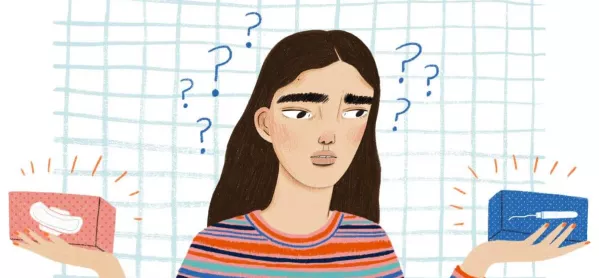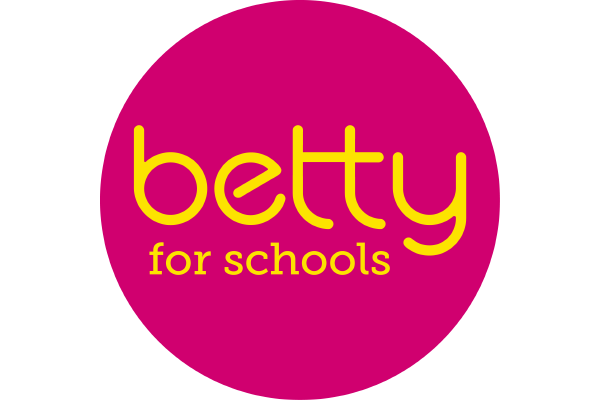So you’ve been asked to teach pupils about periods. Here’s why it’s important (and how to do it well) - Sponsored article

“Can you cover ‘the period talk’ this term?”
It’s a question that can inspire dread. “Do pupils really need it?” some teachers wonder. “I just haven’t got time to add this to the curriculum.”
These are not surprising first thoughts, but avoiding the topic can be harmful to young people in ways you might not expect. Not only is menstruation a vital part of the curriculum, but the menstrual cycle is also an indicator of good health.
Just as you’d measure peak flow to assess lung function at an asthma check-up, or calculate resting heart rate before and after aerobic exercise to find your fitness level, you can actually look at the length, regularity and characteristics of menstrual cycles as a measure of good health.
Healthy discussion
“The period talk”, which should really be considered “the period conversation”, is your first opportunity to model conversations around growing up and healthy relationships, and sets the tone for all the sex and relationships education that follows.
The topic comes with a lot of baggage, but this is your chance to change pupils’ minds about periods.
Make sure you set ground rules for healthy, safe, and respectful discussions according to best practice recommendations from the PSHE association. Include all genders in the conversation, and start early - the earlier, the better.
Find out how much your class already knows, and ask any colleagues for whom you are leading training, or who are also delivering this work, how much they know.
Hormone replacement
In 2013, Michael Gove changed the science curriculum to say that you could teach menstruation “without mention of hormones”. Nevertheless, experts recommend that you definitely should mention them. It is worth spending some time busting biology myths in PSHE lessons, since the science provision amounts to a brief mention in Years 7 and 10.
Some facts to help you bust those myths:
- Not all menstrual cycles are exactly 28 days - the bits before and after ovulation can vary in length.
- The period is just one part of the menstrual cycle, which also includes ovulation and the build-up of the endometrial lining.
- If you happen to ovulate twice a cycle, you could potentially become pregnant while on your period.
- If you abstain from sex during or soon after your period you may have difficulty conceiving, because some menstruators ovulate quite soon after their period has ended.
- On average, each cycle produces between two and six tablespoons of menstrual blood and endometrial tissue. Much more than this, and you should see a doctor with a view to investigating endometriosis or other reproductive health-related medical conditions.
- Periods aren’t necessarily painful or irregular. Familiarise young people with the concerns they should take to a doctor, including polycystic ovarian syndrome, endometriosis, womb-related cancers, sexually transmitted infections (STIs) and toxic shock syndrome which has been linked to tampon use.
Don’t believe the hype
Misconceptions around periods are rife, and many have been prompted by advertisers wanting to boost sales of disposable menstrual products.
So many taboos around menstruation have entered the discourse through disposable menstrual product advertising over the years it’s hard to keep count. From encouraging pupils to buy extra tampons or sanitary towels just in case they leak or stain their clothes, to implying that people smell or you can see menstrual products through clothing, disposables have a lot to answer for.
Advertising has the power to influence young people’s body image and confidence, and can lead to them internalising the shame the advertisements promote. Showing your pupils how to interpret the media’s treatment of taboos will give them powerful tools for deconstructing these messages and is a crucial part of this learning.
When analysing media messages, young people should consider the meaning behind any euphemistic words or phrases, the audience for the advert and whether it uses words that reinforce taboos - words like “whisper”, “secret”, “discreet”, or “hidden”.
Role play, forum theatre, and parody video and print adverts are great ways to deconstruct and reclaim the portrayal of periods.
Period management
When teaching about period management, try to use resources that are unbranded or, if you happen to choose some produced by external companies, remove the branding. Choose resources that also mention reusables and show examples of pads, tampons, cloth pads and menstrual cups.
Look at the ways reusables are promoted as compared to disposables. Weigh up the pros and cons of all four types. Disposables may be convenient, but they also come with a financial and environmental cost, plus plenty of negative messaging.
By dividing menstrual products into four straightforward categories (internal, external, disposable, reusable) it is easy to share plenty of options for period management without focusing exclusively on one type.
It is simple to find resources about disposables, but you can also easily include examples of and information about menstrual cups and cloth pads. You could even involve the textiles department in some cloth-pad making workshops. Plus, menstrual cup companies will usually provide free samples of unused menstrual cups for the class to get to grips with.
Moving forward
In primary schools, this curriculum will probably be planned by the PSHE lead or a small team of teachers. Best practice for SRE is that curriculum changes are shared with parents and school governors.
At secondary, it’s important to ensure there is clear planning and liaison between science, PSHE, health and social care, media studies and colleagues responsible for students with SEND.
Final thoughts
Some additional things to consider are:
- If pupils have a blood phobia, you can try using plush organs and cells - the large cuddly blood cell toy has been well received in classrooms by little ones and by teens feeling a bit squeamish, for example.
- If you’re sharing examples of menstrual cups, tampons, cloth and disposable pads in class, learn about them first yourself. If pupils haven’t come across these products before, have absorbed negative attitudes from family, peers or the media, or simply feel uncomfortable in the lesson, you may have more work to do undoing this.
- Start early, but don’t assume older children know any of this. The Sex Education Forum says that schools are “patchy at best” at teaching SRE topics, so provide top-up lessons for key stages 4 and 5.
- Find ways to sensitively include non-binary and trans kids who menstruate.
So if you’ve been asked to cover “the period talk”, don’t be afraid to take it on. You can make the difference between shame and confidence, or between fear and comfort, for hundreds of young people.
Chella Quint is a menstruation education researcher, a former head of PSHE and founder of #periodpositive (www.periodpositive.com)
You can find a wealth of engaging resources to help you teach period education here.
